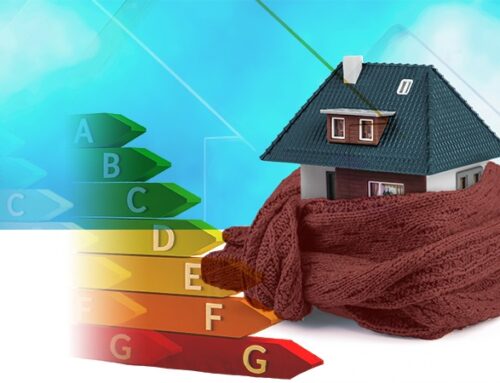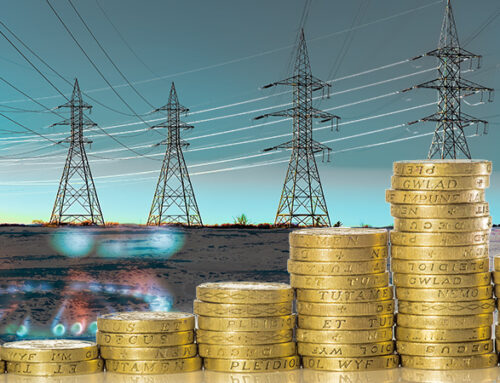The press and politicians are currently full of outrage at the announcement by British Gas of a 12.5% increase in its electricity prices from September, describing the rise as “extortionate”, “unjustified” and a “slap in the face” to families, and once again there are rumblings of price caps.
A spokesperson for the Department for Business, Energy and Industrial Strategy said:
“Energy firms should treat all their customers fairly and we’re concerned this price rise will hit many people already on poor-value tariffs. We are not ruling anything out – whether it is action by the regulator or legislation – to increase fairness for customers.”
The components of electricity bills…
According to Ofgem, the contribution made by wholesale electricity prices to consumer bills is falling, and network costs and environmental and social costs are becoming relatively larger. Interestingly, the most recent breakdown shows that the Big 6 earned pre-tax losses of -1.72% on their retail electricity businesses in the past year.

Wholesale electricity prices have fallen back since the start of the year, although they are higher than they were this time last year. Daily pricing isn’t necessarily instructive in terms of the electricity input costs of the Big 6 since most will use various hedging techniques, typically over 2-year periods, and volumes are not even through the day.
As the amount of renewable energy used increases, so suppliers need to rely on weather forecasting tools to try to inform their trading strategies in order to avoid paying imbalance prices which are highly variable. Since the imbalance price reforms in November 2015, these costs have generally been higher and more volatile. This all means that although trends in wholesale prices affect the suppliers’ cost bases, there certainly isn’t a linear relationship between the two.

According to Ofgem’s most recent RIIO annual reports, the consumer costs associated with transmission and distribution networks fell by 5% between 2015/16 and 2016/17, from a combined cost of £130 per consumer to £124 per consumer.

The Office for Budget Responsibility data from March 2017 indicates that the value of environmental levies has increased from £4.6 billion in 2015/16 to £6.9 billion this year, which corresponds to £169 and £255 per household respectively. This is a year-on-year increase of £86, or 51%.

From these data it is clear that the large increase in environmental costs more than offsets the small fall in network costs, leaving an overall increase of £80 per household. Worryingly, OBR data shows the impact of environmental policy is set to grow even further, reaching £500 per year in 2021/22.
In addition to this, suppliers are also responsible for the Government’s £11 billion smart-meter roll-out, the cost of which is recovered through bills, at over £400 per household. According to moneysupermarket, most suppliers are adding around £6 per year to bills to cover this, which suggests a 68-year life span! A more reasonable recovery rate would be £27/year, since most meters have an estimated 15-year life, although the in-built obsolescence means that many current smart meters are likely to need replacing well before then.
In its press release, Centrica says that the price increase equates to £76 per year for the average customer. It can easily be seen how this increase relates to an additional £86 for environmental costs less £6 for reduced network costs.
….are almost impossible to understand due to lack of transparency
According to Ofgem, the average electricity price for a GB user is 16.86 p/kWh. At an average household consumption rate of 3,500 kWh per year, this translates to an annual bill of £590 for electricity alone.
The OBR data tell us that environmental costs were £169 last year. Ofgem tells us that this equates to 15% of electricity bills (and it is clear that the bulk of these costs apply to electricity rather than gas), so this would suggest total electricity bills of £1,125 which is clearly far higher than the actual level of electricity bills (but close to Ofgem’s level for average dual-fuel bills at £1,142).
Which brings me back to an old complaint which is the overall lack of transparency in electricity billing. Ofgem’s data are derived from the Consolidated Segmental Statements produced by the Big 6 suppliers. Ofgem also produces a cost index to try and explain the cost inputs to electricity prices, but refuses to publish the underlying data for it, making auditing the outputs almost impossible. Attempting to re-produce the data properly accounting for regional differences in transmission and distribution costs is extremely difficult – particularly for anyone who is not already an expert in how these costs work.
The regulator should do more than re-produce data from the Big 6. Instead, it should be publishing independently verifiable data illustrating exactly how various input costs translate into bills, and ensuring that any discrepancies between data sources are investigated and explained.
Are energy bills unfair?
Despite the outrage from sections of the popular press and some politicians, more measured commentators point out that this is a delayed price increase by British Gas, who made a commitment in February to freeze their prices until the summer, when the rest of the Big 6 were implementing increases. As money-saving expert Martin Lewis explained:
“This is British Gas’ catch-up price hike. It was the only one of the Big 6 firms not to raise prices at the start of the year, and now, as predicted, it’ll do it from September. And that means, if, (as is possible) we see another batch of rises this coming winter, its customers will feel like they been price-slapped twice in rapid succession.
While this freeze has given people a little respite from price moves over the key high use winter period – the problem is for many the false sense of security that it wouldn’t move prices meant they did nothing, when they could’ve cut their rate, and locked that in for longer, by actively picking a far cheaper 1 year fixed energy tariff.”
The BBC, usually a cheerleader for all things relating to renewable energy, admits in its Reality Check segment that most of the increased costs came from Centrica having to pay more for renewable energy.
British Gas has not increased its standard variable rate since 2013, and is promising to protect its most vulnerable customers from this increase. It is blaming the current price rise on increasing government and environmental input costs, saying that these costs should be more evenly distributed among energy retailers – currently, smaller suppliers are exempt from contributing towards some policy costs, like the Energy Company Obligation.
It also claims to have been earning little or no profit on its electricity supply business – a claim that is reflected in the most recent Ofgem data for the Big 6 electricity bills.
“We have been selling electricity at a loss, due to transmission and distribution costs associated with feed in tariffs, renewable energy, and the smart meter roll out programme alongside the Data and Communications Centre. We were always very competitive, so we need to restore the balance with these losses. Nobody is trying to apportion blame, but we are recouping the losses through bills rather than general taxation,”
~ Iain Conn, Chief Executive, Centrica.
And this is the crux of the problem. For as long as the costs of Government policy are recovered through bills rather than direct taxation, it will appear that suppliers are to blame for cost increase, when in fact they fall entirely outside their control. Indeed, as I have argued before, the growing levels of external costs faced by suppliers in the form of network, and environmental and social policy costs, the less competitive the market will become.
Rather than re-hashing the same old arguments every few months whenever one of the large suppliers announces a price increase, it’s time to introduce proper price transparency so the consumers and politicians alike can understand the exact drivers of price increases. Moving environmental costs into general taxation would be a good first step, and might have the added benefit of bringing increased scrutiny onto the policy choices behind these ever-increasing costs.






Hi Kathryn
Great article as usual.
One challenge that can be raised relates to one of your conclusions which seems to contrast with the national interest. Specifically, you conclude, “Moving environmental costs into general taxation would be a good first step…”
My understanding is that environmental costs are deliberately applied to energy for the same reason that cigarettes are taxed, namely to motivate consumer behaviour in a way that is consistent with public policy.
While undoubtedly imperfect, public policy recognises that the UK has transitioned from exporting energy in the heyday of the North Sea to an energy importer thus changing the national balance of trade. Not only has the Treasury lost tax and royalty revenues, UK industry is now at the mercy of international commodity prices and much more exposed in the event that any international conflict disrupts energy flows.
Ample analysis has also shown that the energy/capita vs GDP/capita of energy exporters is higher than that for energy importers. It is therefore in the UK national interest to motivate industry to make those long-term structural investments that improve its ability to create more GDP with less energy, and specifically with less *imported* energy, even when short- and medium-term imported commodity prices seem attractive.
Add to this growing international concerns on climate change and the possibility of increased carbon taxation, then levying environmental costs directly on energy consumed induces consumers to make today’s investment decisions on ‘artificially’ high energy costs. In future should carbon taxation be increased, the Government will have the option to adjust the current environmental taxes downwards such that the overall tax burden on the consumer is buffered.
None of this challenges your conclusions that, (a) the current political bleating in relation to British Gas’ price increase is somewhat hypocritical demagogue, and (b) that greater data transparency particularly in relation to OFGEM’s role as regulator is needed. It’s just your conclusion that environmental costs should be moved to general taxation that appear to be unsubstantiated.
Hi Stefano,
I understand the arguments around “polluter pays” but this assumes consumers are able to control their consumption, which for a significant section of society isn’t actually the case. Unfortunately, these people tend to be on lower incomes, and vulnerable in various ways.
People who have to choose between heating and eating have no available funds for insulation/solar panels/more efficient appliances etc. Generally they don’t own their own homes, and live in social housing (councils having no funds either for upgrading the housing stock) or in privately rented accommodation where landlords lack the incentives to adopt energy efficiency measures.
Of course there is some legislation coming in to try to force landlords to make rental properties more energy efficient, but I can see there will be problems with this – it will be interesting to see what the compliance rates are and how it will be enforced, since the housing shortage gives landlords significant leverage.
I also think the arguments around carbon dioxide being responsible for climate change need to be re-visited, since actual inspection of the data doesn’t support this hypothesis. I recognise that this is a controversial view, but if you want some great technical analysis of this question I recommend you visit the Energy Matters blog, where there is extensive data and discussion on the subject from a range of scientists and engineers.
My belief is that energy pricing needs to be more transparent so that the costs of de-carbonisation are clear. I think by moving the costs into general taxation they would be more transparent, and we could avoid the current blame game between energy companies and politicians.
My hope is that in doing so, people would start to question whether the high costs are justified, leading to a move away from de-carbonisation. This would enable policymakers to focus on sustainability (better use of resources) and reductions in particulate pollution which gets overlooked in the fuss about carbon, but which causes more immediate and more damaging health effects.
I absolutely agree with your points on low income families and their lack of choice. However the correct way to deal with that is not to change general energy taxation but instead address the inadequate funding for the social safety net measures aimed at poverty. It seems that the UK government has chosen to systemically cut funding for these measures as well as the NHS, prisons, etc. all with the resulting consequences we now read about daily in the press. Attempting to scapegoat the energy companies is therefore hypocritical and unhelpful.
Personally I don’t share your view on climate change and am more persuaded by the global scientific consensus than alternative arguments. Interesting how in the Trump world of alternative facts, creating confusion and sowing doubt on issues can lead to a loss in geopolitical status (e.g. the US’s recent loss of global credibility and influence due to its executive branch). On climate change, you might like to compare the merits of the arguments on the Energy Matters blog to sites such as https://www.skepticalscience.com/argument.php as a great many climate change denial arguments have already been debunked.
I continue to agree with your points on the need for additional energy price transparency, your the call for fewer shenanigans between politicians and energy companies, and your points on improving the sustainable use of resources and reduction in particulate pollution. However, your assertion that moving decarbonisation costs into general taxation would be good for the nation still appears unjustified. One could also make the point that there is no need to choose between reducing carbon *and* reducing particulate emissions – both should be done concurrently.
I agree there are other ways of supporting low-income families, I just lack confidence that they can be implemented in a way which is simple, effective and transparent. Removing the environmental costs to general taxation would immediately reduce bills by c 15%, and the state budgeting/auditing processes would make them more transparent. I also think the way in which network costs are socialised needs to be reviewed, and possibly recovering these through taxation as well.
On the other hand, I think that energy market pricing needs to change to reflect the true costs of delivering electricity in all periods. This would mean a transfer of costs from “network” to “wholesale” so the impact on bills would be harder to predict.
In any case, I think the current system is full of distortions and far too opaque!
On climate change – my unease pre-dates anything Trump has to say (and I disagree with his position anyway). What has long troubled me is the lack of logical consistency in the work of the IPCC…its reports even admit that the data do not support its model predictions, but refuse to question the validity of the models, instead insisting they are correct despite the data.
The use of “denial” terminology, makes the whole topic have more in common with religion than science….we should not approach sceptics with a “burn the heretic” attitude – the science should speak for itself. Unfortunately much of the “de-bunking” requires processing of the data to support the CO2 leads temperature arguments, when the CO2 lags temperature hypothesis requires less manipulation of data to fit.
It does not seem that proper scientific methods are being followed, which leads me to be suspicious of the conclusions, particularly when the resulting policy effects impose such high costs on consumers.